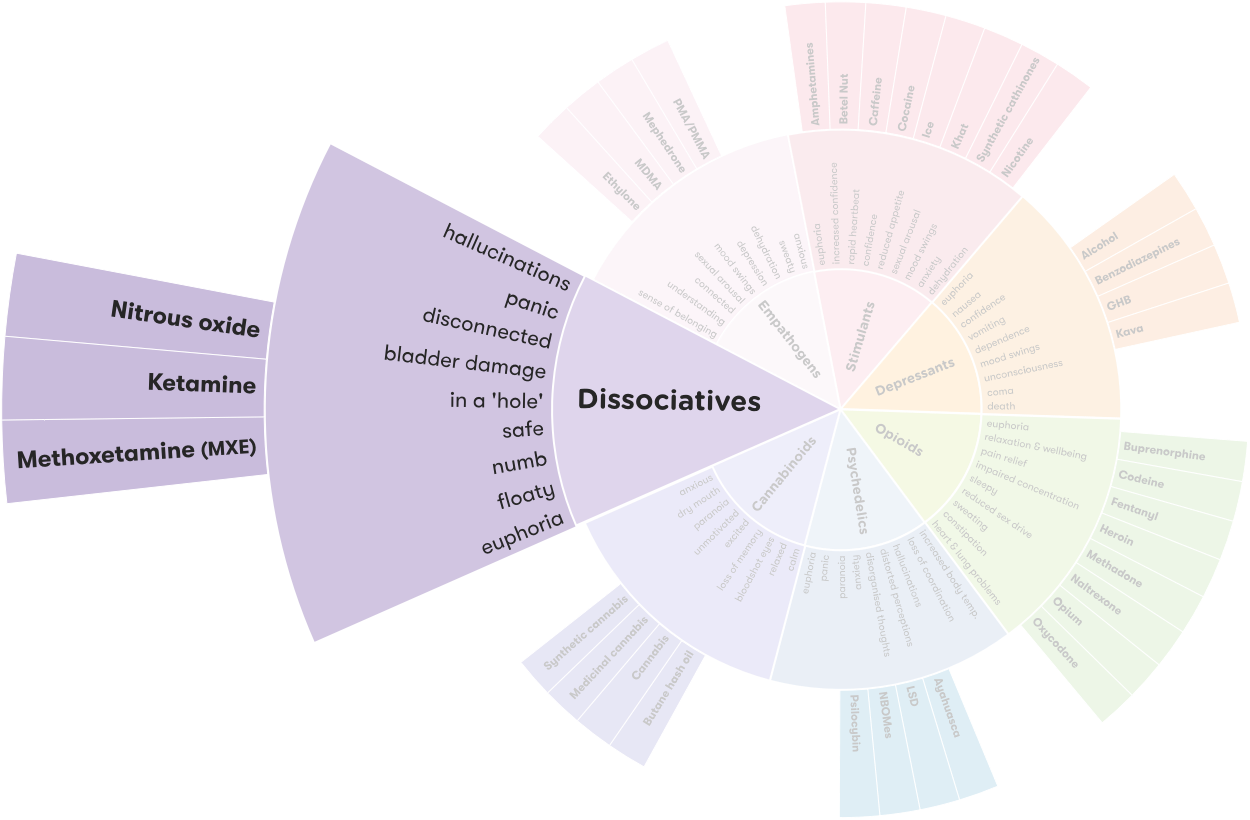How is DXM used?
It’s usually swallowed but the powder can be snorted.5
Effects of DXM
Use of any drug can have risks. It’s important to be careful when taking any type of drug.
DXM affects everyone differently, based on:
- size, weight and health
- whether the person is used to taking it
- whether other drugs are taken around the same time
- the amount taken
- the strength of the drug (varies from batch to batch)
- environment (where the drug is taken).
Effects start within 30-60 minutes and last for around six hours,5 and may include:
- euphoria
- increase in positive mood
- reduced or increased anxiety
- sweating
- itchiness
- tingling sensation
- increased heart rate and blood pressure
- confusion and clumsiness
- fatigue
- difficulty urinating
- visual and auditory hallucinations
- feeling detached from your body
- constipation
- difficulty speaking.5
Impact of mood and environment
Drugs that affect a person’s mental state (psychoactive drugs) can also have varied effects depending on a person’s mood (often called the ‘set’) or the environment they are in (the ‘setting’):
- Set: a person’s state of mind, previous encounters with drug, and expectations of what’s going to happen. For example, feelings of stress or anxiety before using a large amount of DXM may result in an unpleasant experience.6
- Setting: the environment in which someone consumes DXM – whether it’s known and familiar, who they’re with, if they’re indoors or outdoors, the type of music and light. For example, using a large amount of DXM in a calm, quiet and relaxed environment can lead to, or contribute to, a pleasant experience but being in a noisy, crowded place may result in a negative experience.6
Overdose
If you take a large amount, or have a strong batch, you could overdose.
DXM can cause death. Call an ambulance straight away by dialling triple zero (000) if you, or someone else, has any of the following symptoms (emergency services are there to help and can provide instructions over the phone):
- breathing problems
- blueish/grey fingernails and lips
- blurred vision
- very high or very low blood pressure
- rapid heartbeat
- nausea and vomiting
- seizures
- raised body temperature
- extreme drowsiness
- unconsciousness.7
Sometimes other drugs are mixed in with DXM in cough medicine formulations. These drugs are harmful if taken in high doses. Paracetamol, for example, is found in a lot of cough medicine formulations containing DXM, and can damage the liver and cause coma if a lot is taken.1
Coming down
Depending on the amount used, it can take around 4-72 hours to come down from using DXM. You may experience the following effects:
- depression
- headaches
- feeling tired and lazy
- 'brain fog'.2
Long-term effects
Regular use of DXM may eventually cause:
- tolerance
- psychological dependence
- craving and withdrawal feelings
- damage to thinking and memory
- increased risk of psychosis
- liver damage.5,8
DXM and mental health
When taken in high doses (over 1500 mg/day), DXM can cause a state of psychosis with psychological symptoms such as delusions, hallucinations, and paranoia.9
Tolerance and dependence
People who regularly use DXM can become dependent on the drug. They may feel they need DXM to go about their normal activities like working, studying and socialising, or just to get through the day.
They may also develop a tolerance to it, which means they need to take larger amounts of DXM to get the same effect.
DMX also produces cross-tolerance with all dissociatives. This means if you take another dissociative drug after using DXM it will have reduced effects.4
Mixing DXM with other drugs
Mixing DXM with other drugs can have unpredictable effects and increase the risk of harm.
- DXM and anti-depressants: high risk of serotonin syndrome and can cause death (particularly if MAOIs)
- DXM and alcohol/opioids/benzos/GHB: high overdose risk. Loss of control of bodily movements, drowsiness, trouble breathing, vomiting, unconsciousness, possible death.
- DXM and MDMA: high risk of serotonin syndrome.
- DXM and ice/speed/cocaine: increases heart rate, can lead to panic attacks or serious heart issues.2
Use of more than one drug or type of drug consumed at the same time is called polydrug use.10
More on Polydrug use
Polydrug use is a term for the use of more than one drug or type of drug at the same time or one after another. Polydrug use can involve both illicit drugs and legal substances, such as alcohol and medications.
Reducing harm
There are ways you can reduce the risk of harm when using DXM:
- If using a large amount, do so in a comfortable environment with people you trust.
- Start with a smaller amount and see how you react.
- Always measure the dose first. For information on dosing see the Hi-Ground website.
- Avoid using DXM if you have breathing, liver or heart issues.
- Avoid mixing with other drugs or alcohol – DXM mixed with some drugs can cause death.5
Withdrawal
Giving up DXM after using it for a long time is challenging because the body has to get used to functioning without it. Symptoms include:
- cravings
- sweating
- nausea
- apathy
- fatigue
- flashbacks
- fast heartbeat
- constipation.11, 12
Getting help
If your use of DXM is affecting your health, family, relationships, work, school, financial or other life situations, or you’re concerned about a loved one, you can find help and support.
- Call the National Alcohol and Other Drug Hotline on 1800 250 015 for free and confidential advice, information and counselling about alcohol and other drugs.
- Help and support services search
Find a service in your local area from our list. Simply add your location or postcode and filter by service type to quickly discover help near you.
If you're looking for other information or support options, send us an email at druginfo@adf.org.au
Path2Help
Not sure what you are looking for? Try our intuitive Path2Help tool and be matched with support information and services tailored to you.
Find out more
- Department of Justice/Drug Enforcement Administration. DXM 2020 [17.01.2024].
- Tripsit Wiki. DXM [17.01.2024].
- Li L, Vlisides PE. Ketamine: 50 Years of Modulating the Mind. Frontiers in Human Neuroscience [Internet]. 2016 [17.01.2024]; 10.
- Psychonaut Wiki. Dextromethorphan 2023 [17.01.2024].
- Hi-Ground. DXM [17.01.2024].
- Nutt D. Drugs without the hot air: Making sense of legal and illegal drugs. Cambridge: UIT Cambridge Ltd; 2012 [17.01.2024].
- Medline Plus. Dextromethorphan overdose 2021 [17.01.2024]. Available from:
- Adley M. DrugWatch Information Sheet Lean (Purple Drank/Syrup): UK and Ireland DrugWatch; 2018 [17.01.2024].
- Journey J, Agrawal S, Stern E. Dextromethorphan Toxicity, National Library of Medicine: StatPearls; 2023 [17.01.2024].
- Tucker JA, Darke, S, Lappin, J, Farrell, M. The Clinicians Guide to Illicit Drugs and Health: Silverback Publishing; 2019 [17.01.2024].
- Ziaee V, Hamed E, Hoshmand A, Amini H, Kebriaeizadeh A, Saman K. Side effects of dextromethorphan abuse, a case series. Addictive Behaviours [Internet]. 2005 [17.01.2024]; 30(8).
- Mutschler J, Koopmann A, Grosshans M, Hermann D, Mann K, Kiefer F. Dextromethorphan withdrawal and dependence syndrome. Deutsches Arzteblatt International [Internet]. 2010 [17.01.2024]; 107(30):[537-40 pp.].

